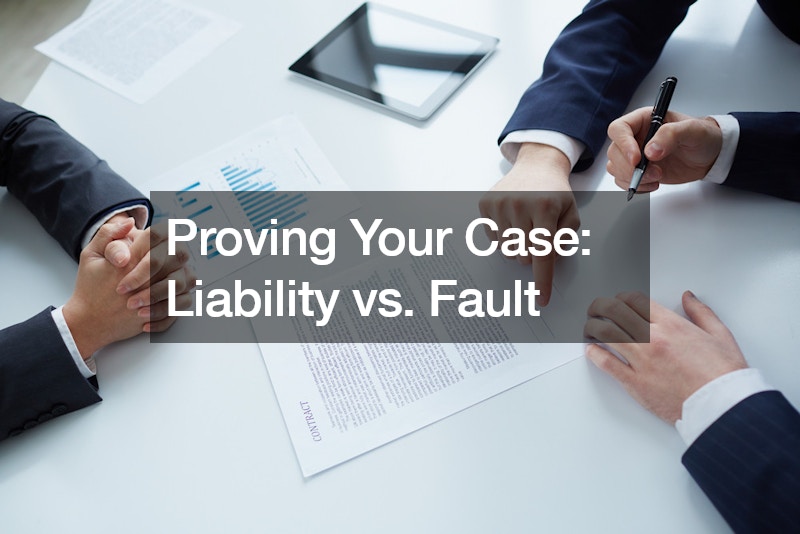Navigating the legal landscape can be an overwhelming experience, especially when it involves personal injuries and workplace accidents. In such situations, understanding the intricacies of personal injury law and workers’ compensation law becomes crucial. Both these legal avenues offer different mechanisms for obtaining compensation, but they operate under distinct frameworks. Hiring a personal injury attorney can help you make informed decisions and guide you through the legal complexities. This article aims to elucidate these two legal areas, highlighting their key differences, proving liability, types of compensation, filing deadlines, and more.
What Is Personal Injury Law?

Personal injury law, also known as tort law, allows an individual to seek compensation if they have been injured due to someone else’s negligence or intentional act. Common examples include car accidents, medical malpractice, and slip and fall incidents. Personal injury cases can get complicated, and that’s why hiring a personal injury law firm that specializes in this field is imperative for a successful claim.
A personal lawsuit attorney will guide you through the entire legal process, from filing the claim to negotiating settlements or taking the case to court if necessary. They collect evidence, interview witnesses, and build a compelling case to prove the defendant’s liability. Their expertise in personal injury law ensures that you receive the compensation you deserve for medical expenses, lost wages, emotional distress, and other damages related to your injuries.
Another crucial benefit of hiring a personal injury attorney is their ability to navigate through the complexities of insurance policies and legal procedures. They will handle interactions with insurance companies, ensuring that your interests are adequately represented and you are not under-compensated for your injuries and losses. Additionally, they provide valuable advice on the best legal strategies and potential outcomes for your case, helping you make informed decisions throughout the process.
What is Workers’ Compensation Law?
Workers’ compensation law is designed to provide financial and medical support to employees who are injured or become ill due to their jobs. Unlike personal injury claims, workers’ compensation is a no-fault system, meaning employees do not need to prove that their employer was negligent. This simplifies the process but also imposes certain limitations on the types of compensation available, such as the inability to claim non-economic damages like pain and suffering.
Employment lawyers specialize in navigating these specific laws and advocate on behalf of workers to ensure they receive the benefits they are entitled to. Hiring a personal lawsuit attorney who is well-versed in workers’ compensation claims can make a significant difference in the outcome of your case. They will help you gather medical records, fill out required forms, and ensure that all deadlines are met, including filing for temporary disability benefits if you are unable to work.
Additionally, a personal law attorney can assist you if your initial workers’ compensation claim is denied. They will help you understand the reasons for the denial, develop a strong case for appeal, and guide you through the legal process to ensure that your rights are protected every step of the way. They can also advise you on potential legal avenues for pursuing additional compensation if your case warrants it.
Key Differences in Legal Framework
One of the key differences between personal injury law and workers’ compensation law lies in their legal frameworks. Personal injury law falls under the category of civil litigation and usually involves proving negligence or fault. This often requires the involvement of criminal defense law firms, especially in cases where reckless behavior leads to severe injuries or wrongful death.
In contrast, workers’ compensation law operates on a no-fault basis. Employees are not required to prove their employer’s negligence to receive benefits. However, this also means that the types and amounts of compensation are generally limited, focusing mainly on medical expenses and a portion of lost wages.
Having a skilled personal lawsuit attorney is crucial in both scenarios. While personal injury claims can potentially yield higher compensation through punitive damages and other financial rewards, workers’ compensation claims offer a more straightforward path to immediate financial support. An experienced attorney can help you navigate the legal framework to maximize your benefits.
Proving Your Case: Liability vs. Fault

Proving liability in a personal injury case involves showing that the defendant’s negligence directly caused your injuries. This often entails collecting substantive evidence such as police reports, medical records, and witness testimonies. For instance, in a semi accident recovery case, demonstrating the truck driver’s fault is integral to winning the case and may involve expert analysis of accident reconstruction or vehicle maintenance records.
A personal lawsuit attorney specializes in building a strong case by gathering evidence and constructing a compelling narrative that clearly depicts the defendant’s negligence. They may also consult with experts in various fields to provide testimony and bolster your case, ensuring you have a solid foundation for your claim. Additionally, they negotiate with insurance companies to ensure you receive fair compensation and advise on legal strategies to strengthen your case.
In workers’ compensation claims, the focus shifts from proving fault to establishing the link between your job and your injury. This can be simpler but may still require comprehensive medical evidence, such as from a foot and ankle specialist doctor, employment records, and accident reports, to document that the injury occurred in the course of employment. A personal law attorney can assist in obtaining the necessary medical reports and other documents that substantiate your claim, making the process more efficient and increasing your chances of a successful outcome.
Types of Compensation Available
Both personal injury and workers’ compensation claims offer different types of compensation. In personal injury cases, victims can receive compensation for medical expenses, lost wages, property damage, pain and suffering, and emotional distress. Accident injury law is often focused on ensuring that victims are fully compensated for all the losses they have incurred.
For workers’ compensation claims, the compensation is generally limited to medical expenses and a portion of lost wages. Unlike personal injury claims, workers’ compensation does not typically provide compensation for pain and suffering. This is one of the key differences that make consulting a personal lawsuit attorney essential in deciding which type of claim to pursue.
A personal law attorney will evaluate your case and advise on the most beneficial course of action. Whether it’s pursuing a personal injury claim or filing for workers’ compensation, their expertise ensures that you receive the maximum possible compensation for your injuries and losses.
Filing Deadlines: Statutes of Limitations
Understanding the filing deadlines, also known as statutes of limitations, is crucial when pursuing a legal claim. In personal injury cases, the statute of limitations varies by state but typically ranges from one to six years. Missing this deadline can result in losing your right to file a lawsuit altogether, which can be detrimental to your case if you do not act quickly.
Workers’ compensation claims also have specific deadlines, usually much shorter than those for personal injury cases. For instance, you may have only 30 days to report your injury to your employer and a limited period to file the actual claim. If you miss these deadlines, you could forfeit your right to receive benefits or face significant delays in the claims process.
Consulting a personal lawsuit attorney can help you navigate these deadlines and ensure all necessary steps are taken promptly. They will help you keep track of critical dates, manage your documentation, and take legal actions within the required time frames. In cases involving medical conditions like foot and ankle injuries, working with specialists and obtaining medical reports promptly becomes essential. A personal law attorney will coordinate with healthcare providers to ensure that all documentation is accurate and submitted on time, strengthening your claim and avoiding any procedural delays or denials.
The Role of Insurance Companies

Insurance companies play a significant role in both personal injury and workers’ compensation claims. In personal injury cases, dealing with automotive insurance ratings can be challenging. Insurers often aim to minimize payouts through tactics such as offering low settlements or disputing liability. A personal lawsuit attorney can advocate for your interests, ensuring you receive fair compensation for all your damages and losses.
In workers’ compensation cases, the insurance company representing your employer will handle your claim and might attempt to limit the scope of benefits you receive. They may employ various strategies to reduce their financial responsibility, such as denying claims or disputing the severity of your injury. A personal law attorney can negotiate with the insurance company on your behalf, ensuring that you receive the full range of benefits to which you are entitled, including medical expenses, wage loss, and rehabilitation costs.
Whether dealing with an automotive accident or a workplace injury, the expertise of a personal law attorney is invaluable in navigating interactions with insurance companies. Their knowledge and experience provide a significant advantage in obtaining the compensation you deserve and overcoming any obstacles posed by the insurance company’s legal maneuvers. By working with an attorney, you can better manage complex insurance procedures, challenge unfair practices, and ensure that all your legal rights are protected.
Appeal Processes: What if Your Claim Is Denied?
It’s not uncommon for initial claims, whether personal injury or workers’ compensation, to be denied. Understanding the appeal process is crucial in such cases. A personal injury lawyer can assist you in understanding the reasons for denial and guide you on how to proceed with an appeal.
In personal injury cases, the appeal process may involve presenting additional evidence, expert testimony, or sometimes taking the case to court for a judge to decide. Having a personal lawsuit attorney by your side is invaluable in navigating these complex proceedings and ensuring your claim is given a fair assessment.
For workers’ compensation claims, the appeal process may involve presenting your case to an administrative law judge or a workers’ compensation board. A personal law attorney will prepare and present a strong case on your behalf, maximizing your chances of a successful appeal and securing the benefits you need.
The Impact of Pre-Existing Conditions
Pre-existing conditions can complicate both personal injury and workers’ compensation claims. Insurance companies and employers may argue that your injury or condition was not caused by the incident in question. For instance, if you have a pre-existing heart condition, it can be challenging to prove that a work-related incident exacerbated it.
A personal lawsuit attorney will gather medical evidence, often by consulting with specialists like heart physicians, to demonstrate how the incident worsened your pre-existing condition. Their expertise ensures that your condition is accurately represented and that you receive the compensation you deserve.
In workers’ compensation cases, the challenge is to demonstrate that your job significantly contributed to or worsened your pre-existing condition. A personal law attorney will help gather necessary medical records and expert opinions to build a strong case that clearly establishes this link, ensuring that your rights are protected.
Choosing Between a Personal Injury and a Workers’ Compensation Claim

Deciding whether to file a personal injury claim or a workers’ compensation claim can be challenging. Consulting a local personal injury attorney can provide valuable insights and help you make an informed decision. They will evaluate the specifics of your case, considering factors like the nature of your injury, the circumstances surrounding it, and potential compensation options.
If your injury occurred at work, but due to a third party’s negligence, you might have the option to pursue both a personal injury claim and a workers’ compensation claim. A personal law attorney can guide you on the best course of action, ensuring that you maximize your compensation by exploring all legal avenues available to you.
Ultimately, the decision will depend on the specifics of your situation and the advice of your legal counsel. Having a skilled personal law attorney by your side ensures that you make the best possible decision, thereby maximizing the compensation and support you receive for your injuries.
Understanding the fundamental differences between personal injury law and workers’ compensation law is crucial for anyone navigating these legal waters. Each offers unique benefits and has specific requirements that must be met. A seasoned personal lawsuit attorney can help clarify these complexities, providing invaluable guidance and representation. Whether it’s dealing with a personal injury law firm or negotiating workers’ compensation claims with employers and insurance companies, their expertise ensures that you receive the compensation and justice you deserve.







